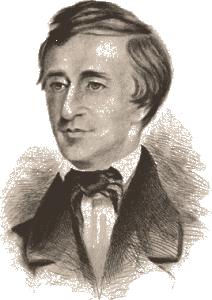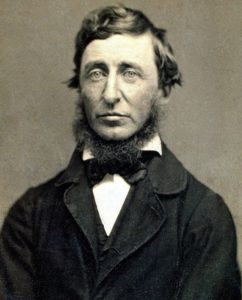Henry David Thoreau (12 Jul 1817 – 6 May 1862)
BIOGRAPHIES, 8 Jul 2019
Ann Woodlief | American Transcendentalism Web - TRANSCEND Media Service
Henry David Thoreau was a complex man of many talents who worked hard to shape his craft and his life, seeing little difference between them. Born in 1817, one of his first memories was of staying awake at night “looking through the stars to see if I could see God behind them.” One might say he never stopped looking into nature for ultimate Truth.
Henry grew up very close to his older brother John, who taught school to help pay for Henry’s tuition at Harvard. While there, Henry read a small book by his Concord neighbor, Ralph Waldo Emerson, Nature, and in a sense he never finished exploring its ideas — although always definitely on his own terms, just as he explored everything! He and his brother taught school for a while but in 1842, John cut himself while shaving and died of lockjaw in his brother’s arms, an untimely death which traumatized the 25 year old Henry. He worked for several years as a surveyor and making pencils with his father, but at the age of 28 in 1845, wanting to write his first book, he went to Walden pond and built his cabin on land owned by Emerson
While at Walden, Thoreau did an incredible amount of reading and writing, yet he also spent much time “sauntering” in nature. He gave a lecture and was imprisoned briefly for not paying his poll tax, but mostly he wrote a book as a memorial to a river trip he had taken with his brother, A Week on the Concord and Merrimack Rivers.
After two years (and two months), Thoreau returned to Concord — a bare two miles away which he had visited frequently during his stay at the pond, having completed his experiment in living and his book. Unfortunately, few people were interested in purchasing his book, so he spent the next nine years, surveying and making pencils at times but primarily writing and rewriting (creating seven full drafts) Walden before trying to publish it. He supported himself by surveying and making a few lectures, often on his experience at Walden pond.
Many readers mistake Henry’s tone in Walden and other works, thinking he was a cranky hermit. That was far from the case, as one of his young neighbors and Edward Emerson attest. He found greater joy in his daily life than most people ever would.
He traveled often, to the Maine woods and to Cape Cod several times, and was particularly interested in the frontier and Indians. He opposed the government for waging the Mexican war (to extend slavery) eloquently in Resistance to Civil Government, based on his brief experience in jail; he lectured against slavery in an abolitionist lecture, Slavery in Massachusetts. He even supported John Brown’s efforts to end slavery after meeting him in Concord, as in A Plea for Captain John Brown.
Thoreau died of tuberculosis in 1862, at the age of 44. His last words were said to be “Moose” and “Indian.” Not only did he leave his two books and numerous essays, but he also left a huge Journal , published later in 20 volumes, which may have been his major work-in-progress. Many memorials were penned by his friends, including Emerson’s eulogy and Louisa May Alcott’s poem, “Thoreau’s Flute.”
Over the years, Thoreau’s reputation has been strong, although he is often cast into roles — the hermit in the wilderness, the prophet of passive resistance (so dear to Mahatma Gandhi and Martin Luther King) — that he would have surely seen as somewhat alien. His work is so rich, and so full of the complex contradictions that he explored, that his readers keep reshaping his image to fit their own needs. Perhaps he would have appreciated that, for he seems to have wanted most to use words to force his readers to rethink their own lives creatively, different though they may be, even as he spent his life rethinking his, always asking questions, always looking to nature for greater intensity and meaning for his life.

…it represents Henry just as he was in that summer…” said Eben J. Loomis of this 1854 portrait of Thoreau (by Samuel Worcester Rowse).
Biographical Readings
- The Life and Times of Henry D. Thoreau by Elizabeth Witherell, with Elizabeth Dubrulle
- Profile of Henry Thoreau by Thomas Hampson
- Introduction to Thoreau by Bradley Dean
- Henry David Thoreau. Wendell Glick, from the Heath Anthology Site.
- Henry Thoreau as Remembered by a Young Friend by Edward Emerson
- Three Thoreaus by Ralph Waldo Emerson, Robert Louis Stevenson & John Burroughs
- Nathaniel Hawthorne on Thoreau
Major Thoreau Sites and other sites
- Thoreau Institute Site Extensive materials on Thoreau’s Life and digital collection of his Writings, including his correspondance.
- The Writings of Henry David Thoreau. This valuable resource includes the Online Journal Transcript. See also the Princeton Editon Archives at the Thoreau Institute .
- The Kouroo Contexture by Austin Brooks. An exhaustive–and continuing–survey of just about anything and anyone connected with Thoreau.
Texts
- The Writings of Henry David Thoreau: The Digital Collection.
- The Writings of Thoreau On-line
- Henry David Thoreau On-line. A thorough collection of Thoreau’s works in html, including some correspondence and many poems.
- Selected Poems.
- Walden Web Study Text.
- Walking See also the Web Study Text [Meg Brulatour]
- On Resistance to Civil Government. See also the Web Study Text. [Jessica Gordon and Ann Woodlief]
- “Ktaadn” passage from The Maine Woods [Web Study Text]
- The Thoreau Reader. [Richard Lenat]
- Analysis and Notes on Walden.[the late Ken Kifer]
- Audio/video reading of Walden by Gordon Mackenzie.
- Select Bibliography on Thoreau
- Henry David Thoreau: A Guide to Resources. Excellent links [Jone Johnson Lewis]
- Thoreau’s Lecturing Activities
- “Man Thinking About Nature: The Evolution of the Poet’s Form and Function in the Journal of Henry David Thoreau 1837-1852”, Honors thesis by S. H. Bagley
- Bibliography of Selected Literary Criticism on Thoreau
- Bibliography of Selected Literary Criticism on Walden
- Introduction to the structure of Walden. A 15-minute audio file by Ann Woodlief, VCU, 1994.
Go to Original – archive.vcu.edu
Tags: Biography, Henry David Thoreau
DISCLAIMER: The statements, views and opinions expressed in pieces republished here are solely those of the authors and do not necessarily represent those of TMS. In accordance with title 17 U.S.C. section 107, this material is distributed without profit to those who have expressed a prior interest in receiving the included information for research and educational purposes. TMS has no affiliation whatsoever with the originator of this article nor is TMS endorsed or sponsored by the originator. “GO TO ORIGINAL” links are provided as a convenience to our readers and allow for verification of authenticity. However, as originating pages are often updated by their originating host sites, the versions posted may not match the versions our readers view when clicking the “GO TO ORIGINAL” links. This site contains copyrighted material the use of which has not always been specifically authorized by the copyright owner. We are making such material available in our efforts to advance understanding of environmental, political, human rights, economic, democracy, scientific, and social justice issues, etc. We believe this constitutes a ‘fair use’ of any such copyrighted material as provided for in section 107 of the US Copyright Law. In accordance with Title 17 U.S.C. Section 107, the material on this site is distributed without profit to those who have expressed a prior interest in receiving the included information for research and educational purposes. For more information go to: http://www.law.cornell.edu/uscode/17/107.shtml. If you wish to use copyrighted material from this site for purposes of your own that go beyond ‘fair use’, you must obtain permission from the copyright owner.

Thanks, Anne!
A HAIKU FOR THOREAU
Peering beyond stars,
he saw God’s face…. Both nodded,
utterly amazed.
–Gary Corseri